Pilgrims – Islamic Hajj, Christian routes and Jewish pilgrimage
- Written by Portal Editor
Even in the earliest history of human development, there were so-called holy places to which people migrated because of their belief in one god, their gods, or because of other cults.
The word "pilgrim", or "pilgrim", which was often used in the past, comes from the Latin word "peregrinus", which in translation can be interpreted as "being abroad". A pilgrim's husband or wife was a person who went abroad for religious reasons, one said to go on a pilgrimage. Whether the purpose of the occasion is a self-imposed penance, the fulfillment of a vow, the hope that prayer will be answered in order to present a specific purpose, or the effort to obtain pardon from sin is as complex as the places and occasions involved. The healing of illnesses, the religious deepening of one's own faith or just giving thanks in a place that is considered sacred often also counts. This place can be a temple, a pilgrimage church or a cave, yes, even tree sanctuaries are visited by pilgrims. We ourselves were surprised by a group of Turkish-Armenian pilgrims at a waterfall near Gömbe.
In the past, people were always and basically on foot
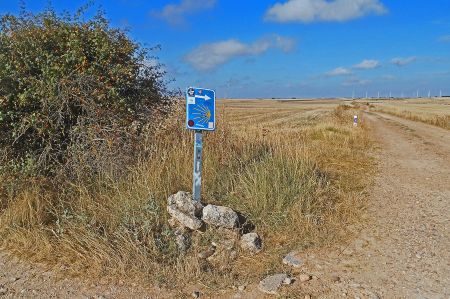 Surely you have already met pilgrims, be it on the well-known pilgrimage routes in Europe or in Asia Minor, maybe you have been a pilgrim yourself, be it on the way to Mecca or to Tarsus, on the Jacob's Way towards Santiago de Compostela or wherever. The way in which the pilgrim route is completed is also mostly complex today. In the past, people were always and basically on foot. Therefore, a pilgrim is also someone who travels "per agrum", meaning "over the country".
Surely you have already met pilgrims, be it on the well-known pilgrimage routes in Europe or in Asia Minor, maybe you have been a pilgrim yourself, be it on the way to Mecca or to Tarsus, on the Jacob's Way towards Santiago de Compostela or wherever. The way in which the pilgrim route is completed is also mostly complex today. In the past, people were always and basically on foot. Therefore, a pilgrim is also someone who travels "per agrum", meaning "over the country".
In many of our articles we have already referred to places of pilgrimage and it becomes clear again and again how similar the three main monotheistic religions are, both in their written explanations and in the activities associated with them. Pilgrims are also a typical example of this.
Probably the most important place of pilgrimage in the world
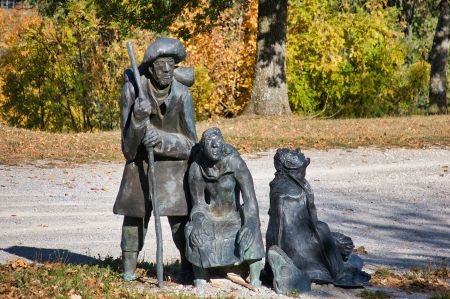 Already in the ancient world of the Greeks there were places of pilgrimage that were regarded as holy places and were visited by people to pray. The most famous place in the Greek world was without a doubt the temple of Artemis in Ephesus. Since the construction of the first Israelite temple, Jerusalem has been the most important place of pilgrimage in the world, because the city is not only the central sanctuary of the Jews but also sacred to all three monotheistic world religions, even if the importance and the occasions are viewed differently. For Christians and Jews, because of the death and resurrection of Jesus Christ, it is probably the most important place of pilgrimage, while in Islam the Hajj pilgrimage to Mecca and Medina comes first, followed only by the Dome of the Rock of Jerusalem.
Already in the ancient world of the Greeks there were places of pilgrimage that were regarded as holy places and were visited by people to pray. The most famous place in the Greek world was without a doubt the temple of Artemis in Ephesus. Since the construction of the first Israelite temple, Jerusalem has been the most important place of pilgrimage in the world, because the city is not only the central sanctuary of the Jews but also sacred to all three monotheistic world religions, even if the importance and the occasions are viewed differently. For Christians and Jews, because of the death and resurrection of Jesus Christ, it is probably the most important place of pilgrimage, while in Islam the Hajj pilgrimage to Mecca and Medina comes first, followed only by the Dome of the Rock of Jerusalem.
Overland route from Bordeaux to Jerusalem
 Christian pilgrimages to Jerusalem have been taking place since the 4th century. A major reason for this was the spread of the word that Empress Helena had found the cross relics in Jerusalem, the city where Jesus lived. Well-known personalities of that time visited the holy places of Jerusalem, among them the consecrated virgin Egeria, the noble Romaness Paula with her daughter, the virgin Eustochium, who belonged to the circle of St. Jerome. The first records of the travel routes with details of the individual stages already existed at this time. There is a travel guide written in Latin from the year 333, which bears the title "Itinerarium Burdigalense" and describes the journey of a Christian pilgrim in detail, covering the land route from Bordeaux to Jerusalem. Only a few years later, Rome also gained great importance as a place of pilgrimage, because there are the tombs of the apostles Peter and Paul. In the Middle Ages, Santiago de Compostela also gained its reputation as a place of pilgrimage. However, this was also due to the fact that there was an excellent infrastructure through monasteries, which were able to provide for the pilgrims well via a wide-ranging network of hostels. The pilgrims fell into disrepute, mainly due to the Crusades to the Holy Land, since the Crusaders saw themselves as armed pilgrims and were responsible for a large number of massacres.
Christian pilgrimages to Jerusalem have been taking place since the 4th century. A major reason for this was the spread of the word that Empress Helena had found the cross relics in Jerusalem, the city where Jesus lived. Well-known personalities of that time visited the holy places of Jerusalem, among them the consecrated virgin Egeria, the noble Romaness Paula with her daughter, the virgin Eustochium, who belonged to the circle of St. Jerome. The first records of the travel routes with details of the individual stages already existed at this time. There is a travel guide written in Latin from the year 333, which bears the title "Itinerarium Burdigalense" and describes the journey of a Christian pilgrim in detail, covering the land route from Bordeaux to Jerusalem. Only a few years later, Rome also gained great importance as a place of pilgrimage, because there are the tombs of the apostles Peter and Paul. In the Middle Ages, Santiago de Compostela also gained its reputation as a place of pilgrimage. However, this was also due to the fact that there was an excellent infrastructure through monasteries, which were able to provide for the pilgrims well via a wide-ranging network of hostels. The pilgrims fell into disrepute, mainly due to the Crusades to the Holy Land, since the Crusaders saw themselves as armed pilgrims and were responsible for a large number of massacres.
"He who makes a lot of pilgrimages seldom becomes holy"
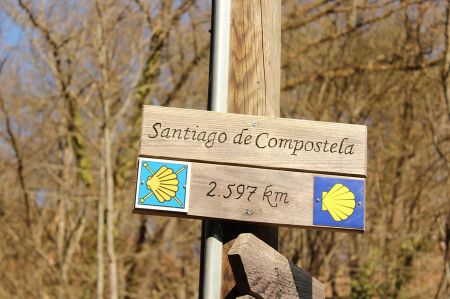 It was not until the Reformation of Martin Luther, but also of the reformers Zwingli and Calvin, that harsh criticism was leveled at the rampant pilgrimage, which ultimately also led to a change of heart. Superstition and the sale of indulgences had long since blurred the real meaning of pilgrimages. "Whoever makes a lot of pilgrimages rarely becomes holy," said Thomas von Kempen. With the change to Protestantism in Norway in 1537, pilgrimages were even punishable by death.
It was not until the Reformation of Martin Luther, but also of the reformers Zwingli and Calvin, that harsh criticism was leveled at the rampant pilgrimage, which ultimately also led to a change of heart. Superstition and the sale of indulgences had long since blurred the real meaning of pilgrimages. "Whoever makes a lot of pilgrimages rarely becomes holy," said Thomas von Kempen. With the change to Protestantism in Norway in 1537, pilgrimages were even punishable by death.
Today, pilgrimages and pilgrimage routes are promoted primarily in the Catholic Church, in contrast to the Protestant faith. Anyone who has ever been to Lourdes, one of the most famous pilgrimage destinations on the Marian pilgrimage, knows how attractive these places are for believers. Crowds of people are moved with coaches, who then make pilgrimages in long trains to the holy places and get blessed water. It is often precisely the "miracle cures" of terminally ill people that add to the attractiveness of a place of pilgrimage. Rarely have we seen such a commercialized city center with its huge range of bottles and jars as in Lourdes. In recent decades, the Way of St. James has been increasingly rediscovered, along with many other pilgrimage routes. More recently, however, there are also places that lead in the footsteps of the apostle Paul: Tarsus, Antakya and Cappadocia. The Islamic country of Turkey is also becoming increasingly involved in pilgrimage tourism. In some places, former Christian buildings have already been restored and renovated, including the Basilica of the Apostle.
Pilgrimage in the Koran as a religious duty
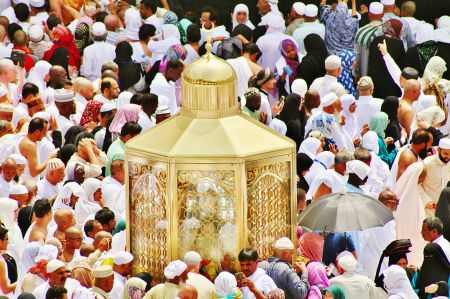 There are also comparable developments in Islam, the Hajj. Every free, adult and healthy Muslim - male or female - who can afford it is obliged to make a pilgrimage to Mecca once in their lifetime. The pilgrimage is enshrined in the Koran as a religious duty with a certain limitation:
There are also comparable developments in Islam, the Hajj. Every free, adult and healthy Muslim - male or female - who can afford it is obliged to make a pilgrimage to Mecca once in their lifetime. The pilgrimage is enshrined in the Koran as a religious duty with a certain limitation:
"And the people have an obligation to God to make the pilgrimage to the house - as far as they find a way to do it." - Sura 3, verse 97. The person who performed the Hajj therefore bears the honorary title "Hājj".
The table below lists the pilgrims to Mecca by year and whether they are Saudi citizens.
n.H./n. Chr. Saudis Non-Saudis Total Percentage non-Saudis
in total number
1416/1996 784,769 1,080,465 1,865,234 58%
1417/1997 774,260 1,168,591 1,942,851 60%
1418/1998 699,770 1,132,344 1,832,114 62%
1419/1999 775,268 1,056,730 1,831,998 58%
1420/2000 571,599 1,267,555 1,839,154 69%
1421/2001 549,271 1,363,992 1,913,263 71%
1422/2002 590,576 1,354,184 1,944,760 70%
1423/2003 610,117 1,431,012 2,041,129 70%
1424/2004 592,368 1,419,706 2,012,074 71%
1425/2005 629,710 1,534,769 2,164,469 71%
1426/2006 573,147 1,557,447 2,130,594 73%
There is a high probability that even the masculine Arabic word "Hajj" is related to the Hebrew wordחג (Chag "festival"), which is used in the biblical context for the three Jewish pilgrimage festivals of Passover, Shavuot and Sukkot. The root also exists in Aramaic and its later offshoots with the same meaning.
Hardly a believing pilgrim will disregard or even mock the faith of the other pilgrim
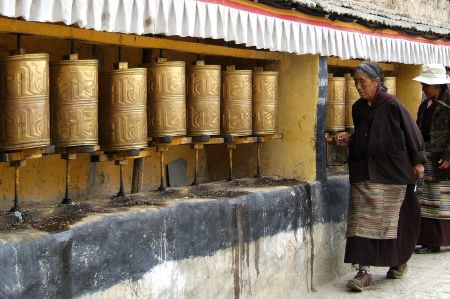 Even if the number of pilgrims, regardless of whether they are Christian, Jewish or Islamic, is currently higher, the meaning for the believers is unfortunately too often misinterpreted. Hardly a believing pilgrim will disregard or even mock the faith of the other pilgrim, because faith also obliges to tolerance towards the other. It is often the religious leaders who present their own religion as the only true one and then call for fanaticism. Here it can be quite helpful if one were to look back at the common origin in order to draw one's lessons from it. "Crusaders", no matter which religion they belong to, are not a solution for anyone.
Even if the number of pilgrims, regardless of whether they are Christian, Jewish or Islamic, is currently higher, the meaning for the believers is unfortunately too often misinterpreted. Hardly a believing pilgrim will disregard or even mock the faith of the other pilgrim, because faith also obliges to tolerance towards the other. It is often the religious leaders who present their own religion as the only true one and then call for fanaticism. Here it can be quite helpful if one were to look back at the common origin in order to draw one's lessons from it. "Crusaders", no matter which religion they belong to, are not a solution for anyone.
Please read as well:
Erfurt Christmas market - scent of mulled wine & gingerbread
Ágios Pávlos - The S. Pauls spring next to Neos Marmaras
